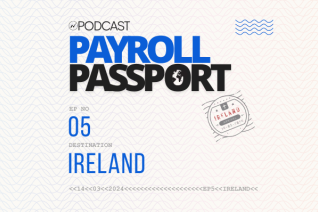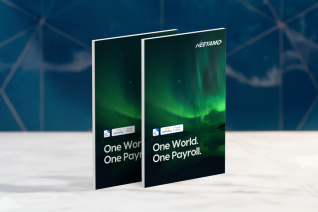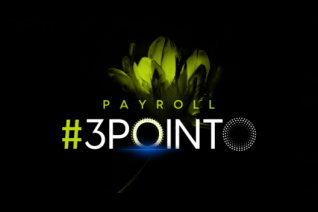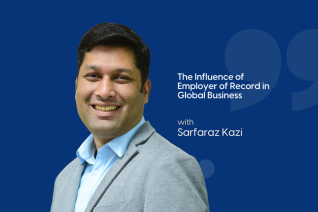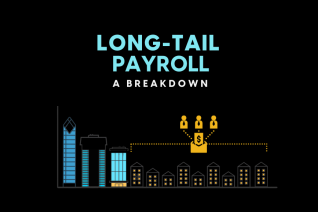Establish your presence globally with Neeyamo as we help you go beyond borders to manage your international payroll and hire new talent in Ireland.
Overview
The "Spooky Season" excitement is universal, captivating people of all ages. Children eagerly anticipate trick-or-treating, while adults delight in decorating their homes and distributing candy. Surprisingly, despite its association with America, Halloween finds its roots in Ireland, dating back to around 100 A.D.
Ireland's historical connection to one of the world's most cherished festivals highlights its rich cultural heritage. It's also a prime location for businesses seeking global expansion, thanks to its skilled and dedicated workforce, business-friendly environment, and access to the European market.
Do your organization's expansion plans require you to hire employees in Ireland? Do you lack a physical entity in the country – a key requisite to hiring local talent? Neeyamo assists organizations worldwide with onboarding and managing employees in Ireland, processing payroll and tax services, managing local compliance requirements, benefits, and more.
Our Presence
Tools And Instances
Facts And Stats
Capital
Dublin
Currency
Euro
Official Language
Irish
Fiscal Year
1 January - 31 December
Date Format
DD/MM/YYYYY
Country Calling Code
+353
Time Zone
GMT +01:00
Global Payroll
Overview
What is Global Payroll?
Handling payroll for a widespread workforce can pose a significant challenge for any organization, and the added complication of compliance can make things worse. If companies spend more time processing payroll, it directly impacts day-to-day operations and their overall productivity.
Over the years, Neeyamo has observed these complexities and strived to provide a global payroll solution through a single technology platform - Neeyamo Payroll. Neeyamos global payroll services ease the process for companies looking to outsource their global payroll requirements and aid them in maneuvering payroll Ireland. Neeyamos payroll software provides the perfect solution for all your global payroll needs – for employees working in primary geographies, the long-tail region, remote or internationally located.
How is payroll done?
Neeyamo acts as your personalized Payroll Calculator. Ensuring adherence to local regulatory requirements using multi-level controls. Providing timely and accurate payroll, courtesy of our experts worldwide and using a tech-based integrated smart helpdesk solution with seamless support experience manned by payroll experts - Neeyamo has all your payroll needs covered.
Payroll Taxes
Payroll tax is the percentage amount retained from an employee's salary and paid to the government to invest in the general population's welfare. These are statutory in nature and are levied from both the employer and employee. Additional statutory contributions are made by employers towards providing both short-term and long-term benefits for their employees.
Employee Taxes
Total Employee Cost - 4.50% to 12.00%
Social Security PRSI - 4.00%
Universal Social Charge (USC) (There is no change to tax rates for 2022, the standard rate will remain at 20% and the higher rate at 40%.) - 0.50-11.00%
The employee income tax bracket is as follows:
Single or widowed, no children:
Up to 36,800 EUR - 20.00%
Over 36,800 EUR - 40.00%
Married couple, one household income:
Up to 45,800 EUR - 20.00%
Over 45,800 EUR - 40.00%
Married couple, two household incomes:
Up to 73,600 EUR - 20.00%
Over 73,600 EUR - 40.00%
Employer Taxes
Total Employee Cost - 8.80% to 11.05%
Social Security PRSI - 8.80% to 11.05% (Reduced to 8.80% where earnings are below the threshold of 410 EUR)
Payroll Cycle
Overview
Undoubtedly, payroll is a critical process for any organization. Pay cycle in Ireland refers to the period for which an organization pays its employees, and this can vary depending on the pay frequency that the organization chooses to adopt.
Frequency
In Ireland, employees get paid monthly.
13th Month Cycle
There is no provision for 13th month salary.
Global Work
Overview
What is Employer of Record?
An Employer of Record (EOR) service provider helps you eliminate the hassle of handling complexities while onboarding a new employee in an international location. They help bridge the gap that otherwise mandates organizations to have a local registered entity and a local bank account, prior to making a job offer to an international hire.
An Employer of record service provider acts as a legal employer, facilitates salary payments, and manages other statutory requirements such as health insurance, payroll taxes, and employee benefits ensuring compliance with local tax laws and regulations.
This allows organizations to focus on collaborating with the employee in Ireland for operational tasks, with the knowledge that they have a cost-effective solution support their global payroll and HR requirements, as they continue their global expansion.
HR Mandates and Practices
Minimum Wage
Effective January 1, 2025, the government of Ireland has officially announced an increase in the national minimum wage, raising it to €0.80 per hour. This wage adjustment represents a notable increase from the previous rate of €13.50 per hour.
The Irish Official Gazette published Statutory Instrument No. 563/2024 on October 25, 2024, establishing an increase in the statutory minimum wage, effective January 1, 2025.
- New Minimum Wage: €13.50 per hour
- Previous Rate: €12.70 per hour
Effective January 1, 2026, the national minimum hourly wage will be €14.15.
- Board (Meals): €1.27 per hour worked.
- Lodgings (Accommodation): €33.42 per week, or €4.77 per day.
Overtime
All work more than the standard working hours a week is to be paid as overtime and is regulated by employment contract/collective agreements.
There is no legal right to pay for working extra hours and no statutory levels of overtime pay. However, many employers pay employees higher rates of pay for overtime as stipulated within the employment contract.
Specific employment sectors have higher pay rates for overtime than regular hours. Employment Regulation Orders and Registered Employment Agreements cover this.
Data Retention Policy
The general principle is that personal data is retained for a period that does not exceed the period required to achieve the data's purpose (Art 5. GDPR) and our general obligations under GDPR and the Data Protection Acts 1988-2018.
Hiring and Onboarding Requirements
Hiring
Hiring of employees: Preference and discrimination There are no requirements to give preference to particular groups of people. Employers are obliged under the Employment Equality Acts not to discriminate on any of the discriminatory grounds listed under the Acts (ie, gender, marital status, family status, sexual orientation, religion, age, disability, race, or membership of the Traveller community) concerning access to employment.
Onboarding
1. Employer verification and references: It is common practice for prospective employers in Ireland to:
Ask candidates to provide the names and contact details of one to two previous employers for references; and
Notify candidates that such referees may be contacted when a job is offered.
2. Education verification: It is common practice for prospective employers to request proof of a candidate's education.
3. Identity verification: An employer may request a visual review of a candidate's passport.
Probation
Probation is between 6 and 12 months.
Leave
Public Holidays
- January 1 - New Year's Day
- February 6 - St. Brigid’s Day
- March 17 - St. Patrick's Day
- April 10- Easter Monday
- May 1 - May Day
- June 5 - June Bank Holiday
- August 7 - Bank Holiday
- October 30 - October Bank Holiday
- December 25 - Christmas Day
- December 26 - St. Stephen's Day
June 26, 2023: Irish Government announced the commencement date for the provisions relating to unpaid medical care leave and time off for breastfeeding will be effective from July 3, 2023.
Extension of Breastfeeding Breaks
Nursing employees can take paid breastfeeding breaks (one hour per day) for two years following childbirth instead of six months.
Unpaid Medical Care Leave
Employees can request an unpaid carer's leave for a maximum of five working days per calendar year to care for seriously ill family members and persons living in their households.
Employees may not take leave for periods shorter than one day.
Employees must inform their employer in writing that they have taken or intend to take this leave, the date of commencement, the duration, and a statement of the facts entitling the employee to the leave.
There is no minimum service requirement for this new leave.
Paid domestic violence leave
The bill introduces a five-day government-paid leave for issues relating to the employee suffering from or at risk of domestic violence.
The leave aims to enable the victim of domestic abuse to take necessary actions, such as arranging for their safety or attending court hearings, medical, counseling, or legal appointments. The leave applies to fixed-term and part-time employees once in any 12 months. Government regulations are expected to prescribe the new leave's daily pay rate.
The regulations will be enacted in the third session of the year.
Sick Leave
The Act, which provides Ireland's first statutory sick pay scheme for employees, was signed into law on July 20, 2022, and will become effective on January 1, 2023.
Requirements for employees:
The Act stipulates that employees must have 13 weeks' of continuous service with their employer before they have a statutory right to sick pay. The employee must also be certified by a GP as unfit to work.
Employee entitlements under the Act:
Paid sick leave for up to 3 sick days per year. This will increase to 5 days in 2024, 7 days in 2025, and 10 days in 2026.
The payment rate for statutory sick leave is 70% of normal wages to be paid by employers (up to a maximum of €110 per day).
Take a complaint to the WRC, where they are not provided with a company sick pay scheme.
Maternity Leave
Female employees are entitled to 26 consecutive weeks of maternity leave, regardless of their length of service. An employer is not obligated to pay an employee on maternity leave. The employee may, however, be entitled to state social welfare payments at approximately 80 percent of her earnings, provided she has accrued sufficient pay-related social insurance contributions in the year before the maternity leave. An employee must give the employer four weeks' notice in writing of her intention to take maternity leave.
An employee is entitled to 16 additional weeks of unpaid maternity leave without entitlement to social welfare payments. Employees are also entitled to paid time off during working hours for pre-and post-natal medical appointments.
Paternity Leave
Working fathers are entitled to two weeks of paternity leave. The employer is not required to pay an employee on paternity leave, although he may be eligible for social insurance benefits. The leave is open to all fathers, including same-sex couples and those adopting. The leave can be taken any time in the 26 weeks following the child's birth. Four weeks' notice must be given to the employer before taking the leave.
Annual Leave
Annual leave entitlements can be calculated in the following ways:
Method 1: four working weeks in a leave year (leave year runs from April 1 to March 31) in which the employee works at least 1,365 hours (unless it is a leave year in which the employee changes employment);
Method 2: one-third of a working week for each month in which the employee works at least 117 hours; and
Method 3: 8% of the hours worked in a leave year (up to a maximum of four weeks).
Employees may use whichever of these methods gives them greater entitlement. The annual leave of an employee who works eight or more months in a leave year must include an unbroken period of two weeks.
Adoption Leave
An adopting mother or sole adopting father is entitled to 24 weeks' adoption leave. Employees taking this leave may be entitled to receive social welfare payments provided sufficient social insurance contributions have been made.
All adopting employee couples can choose which parent may avail of adoptive leave, including male same-sex couples who were previously not part of the regulation.
Employees are entitled to an additional unpaid adoption leave of 16 weeks, for which no social welfare payments are available. Adopting parents are entitled to paid time off to attend preparation classes and pre-adoption meetings with social workers required during the pre-adoption process.
Force Majeure Leave:
An employee may leave work when their immediate presence is indispensable due to the injury or illness of certain close relatives. Such leave is subject to a maximum of three days in any one year or five days in any three-year period and is paid for by the employer. Force majeure leave does not give any entitlement to leave following the death of a close family member.
Carer’s Leave:
According to the law, an employee who has worked for the same employer for 12 consecutive months is eligible for carer's leave, which allows them to take time off from work to provide full-time care and attention to a person in need. This leave can last for up to 65 weeks per relevant person.
Termination
Overview
Termination Process
Employers can terminate a fix term contract by giving the following reasons – business, personal, or workers misconduct. It requires notice and a written explanation for the termination. If the cause is misconduct, a warning needs to be given with the employee given a chance to explain his/her actions.
When employment ends, employees shall receive any money owed and a payslip.
Revenue Payroll Notifications (RFNs) are available in real-time for new employees (following the implementation of real-time information, the issuing of P45’s & P46 forms are no longer required)
Notice Period
Per the contract terms, the notice period depends on the length of employment.
Notice should be made by both an employee and employer as follows:
13 weeks-2 years: 1 week
2-5 years: 2 weeks
5-10 years: 4 weeks
10-15 years: 6 weeks
15+ years: 8 weeks
Payment can be made in lieu of notice.
Severance Pay
When dismissed, they have the right to receive wages owed to them for work completed. They are also to receive payment for annual leave earned but not taken.
Employers are not required to pay severance to employees who have been terminated.
For cases of redundancy, employees are eligible to receive:
-
two weeks' pay
-
extra bonus week
Redundancy pay is set to a maximum limit of 600 per week. A worker with five years of consecutive employment is eligible for 11 weeks of redundancy pay.
Visa
Overview
Non-residents of Ireland are classified into two primary groups, European nationals (EEA) and non-European nationals (Non- EEA). EEA nationals can seek work without requiring a work permit, and non-EEA nationals must apply and pay for a work permit or Green Card. The permit is initially granted for two years.
Foreign workers in Ireland must have a valid work permit if their salaries exceed a certain threshold and are subject to Irish taxation on incomes earned in Ireland and abroad.
Further changes may come into force in 2021 following Brexit implementation.
Short Stay Visas
All applicants for a short stay ‘C’ visa (whether for a single entry or multiple entries) must show that they have a sufficiently strong family, social or economic ties to a place of residence in a country other than Ireland to assure the visa officer assessing the application that the projected stay in Ireland will be temporary and in accordance with the duration and conditions of the permission granted by the immigration authorities on arrival in Ireland.
Types of stay include Business, Conference or event, Tourist, and Internship.
The maximum stay allowed under a short stay ‘C’ visa is 90 days.
Long Stay Visas
Individuals wishing to travel to Ireland for more than three months, for example, to pursue a course of study, for work or to settle permanently in Ireland with family members who are already residents in Ireland, then they can apply for a long stay ‘D’ visa for a single entry.
If they are granted a long stay ‘D’ visa and wish to remain in the State for longer than three months or beyond the period of leave given to them by an Immigration Officer at an Irish port of entry, they will be required to register and obtain a residence permit.
Employee Background Checks
Legal and Background Checks
Criminal records
Criminal record checks are relatively uncommon in Ireland and only permitted in very limited circumstances. Any results are subject to significant restrictions under data protection law.
Medical history
Pre-employment medical checks may be justified where health or fitness is relevant to the role.
Drug screening
Although there are no express or statutory restrictions against drug and alcohol screening of job applicants, there are risks associated with such tests due to the various restrictions and duties under data protection and employment equality legislation.
Immigration status
Employers may request immigration status verification where this is necessary to ensure that the candidate has the right to work in Ireland.
Social media
Employers may use social media to screen prospective employees, and this practice is becoming increasingly common in Ireland.
Therefore, it is not possible to terminate or cancel the employment contract on this basis.
Last updated on October 15, 2025
If you have any queries or suggestions, reach out to us at irene.jones@neeyamo.com
Have Queries? Get In Touch With Us
Get in touch with one of our experts and take a quick demo of our services





